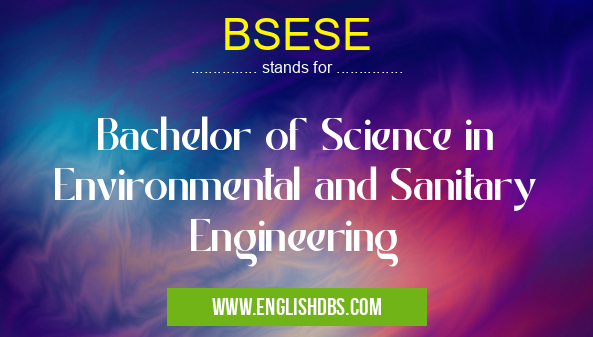What does BSESE mean in ACADEMIC DEGREES
Bachelor of Science in Environmental and Sanitary Engineering (BSESE) is an undergraduate degree program that focuses on the study of environmental and sanitary engineering. It covers topics such as water supply, wastewater treatment, solid waste management, air pollution control, soil science, hazardous material management, ecology, energy conservation and environmental law. This program prepares students to become environmentally responsible engineers and knowledgeable professionals in the related fields.

BSESE meaning in Academic Degrees in Academic & Science
BSESE mostly used in an acronym Academic Degrees in Category Academic & Science that means Bachelor of Science in Environmental and Sanitary Engineering
Shorthand: BSESE,
Full Form: Bachelor of Science in Environmental and Sanitary Engineering
For more information of "Bachelor of Science in Environmental and Sanitary Engineering", see the section below.
Essential Questions and Answers on Bachelor of Science in Environmental and Sanitary Engineering in "SCIENCE»DEGREES"
What is a BSESE Degree?
A BSESE Degree stands for Bachelor of Science in Environmental and Sanitary Engineering. It is an undergraduate degree program that focuses on the study of environmental and sanitary engineering.
What topics are covered in the program?
Topics covered by the program include water supply, wastewater treatment, solid waste management, air pollution control, soil science, hazardous material management, ecology, energy conservation and environmental law.
What skills can I learn from this degree?
Students who complete a Bachelor's Degree in Environmental & Sanitary Engineering acquire skills such as environmental protection techniques; hydrology; economic evaluation of projects; geology; geographic information systems; computer programming for engineering applications; laboratory analysis; hazardous materials management; atomic absorption spectroscopy; design of urban sewer systems; water-supply systems design and operation ; industrial waste disposal practices ; construction methods related to water supply and sewage disposal system designs/construction ; instrumentation calibration/adjustment ; operations of pumps/engines ; modeling of water quality systems ; field sampling protocols ; natural resource assessments/management practices; public health policies/practices.
What kind of career opportunities can I pursue with the degree?
Careers that can be pursued from a BSESE degree include environmental engineer, sanitarian inspector, wastewater engineer or technician plant operator or supervisor, toxicologist or chemist analylst. These jobs may involve working for government agencies or private companies dealing with sanitation related issues.
How long does it take to complete this degree?
Typically it takes 4 years to complete this degree. It includes coursework focusing on areas like hydraulics and fluid mechanics concepts as well as topics pertaining to environmental engineering principles such as air quality standards regulations and wastewater treatment process design standards.
Final Words:
The Bachelor's Degree in Environmental & Sanitary Engineering provides students with many potential benefits including career opportunities in various positions related to sanitation engineering as well as understanding of how engineering principles work together with environment laws to ensure sustainability in our societies. This broad range of knowledge is acquired through focused courses over a period of four years but will serve students well when they apply their studies into their practice.
